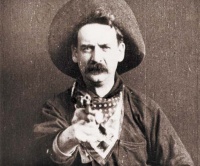Cinema
From The Art and Popular Culture Encyclopedia
|
"With the arrival of cinema, French philosopher Henri Bergson felt the need for new ways of thinking on movement and coined the terms "image-temps" and "image-mouvement" in Matière et Mémoire (1896). Gilles Deleuze, another French philosopher, took Matière et Mémoire as the basis of this theory on and used it to explain his views in his Cinéma I & II (1983-1985)." --Sholem Stein |

A simple example of a cliché in an art form is that of a western film where two men face each other on a dusty and empty road; one dons a black hat, the other white. Independent of any external meaning, there is no way to tell what the situation might mean, but due to the long development of the "western" genre, it is clear to the informed audience that they are watching a gunfight showdown between a good guy and a bad guy.

This page Cinema is part of the film series.
Illustration: screen shot from L'Arrivée d'un train en gare de La Ciotat
Illustration: screen shot from L'Arrivée d'un train en gare de La Ciotat
|
Related e |
|
Featured: |
Cinema may refer to:
- Film, a series of still images which, when shown on a screen, creates the illusion of moving image
- Filmmaking, the process of making a film
- Movie theater, a building in which films are shown
Etymology
Borrowing from French cinéma, shortening of cinématographe (term coined by the Lumière brothers in the 1890s), from Ancient Greek κίνημα (kínēma, “movement”)
Namesakes
- Visual Pleasure and Narrative Cinema is a feminist film essay by British academic Laura Mulvey, written in 1973 and first published in 1975.
- What is Cinema? (original French Qu'est-ce que le cinéma?) is a collection of film essays by André Bazin
- Cinema Paradiso, a 1988 Italian romantic drama film written and directed by Giuseppe Tornatore.
- Expanded Cinema by Gene Youngblood (1970), the first book to consider video as an art form
- To Each His Own Cinema (Chacun son cinéma : une déclaration d'amour au grand écran) is a 2007 French anthology
- The Pervert's Guide to Cinema (2006) is a two-hour documentary by Sophie Fiennes, scripted and presented by Slavoj Žižek.
See also
- Cinephilia
- Cinematography, the art of recording visual images
- Cinematic effects in literature
- History of fiction
- Paracinema
- Visual culture
- Sequential art
Unless indicated otherwise, the text in this article is either based on Wikipedia article "Cinema" or another language Wikipedia page thereof used under the terms of the GNU Free Documentation License; or on research by Jahsonic and friends. See Art and Popular Culture's copyright notice.

